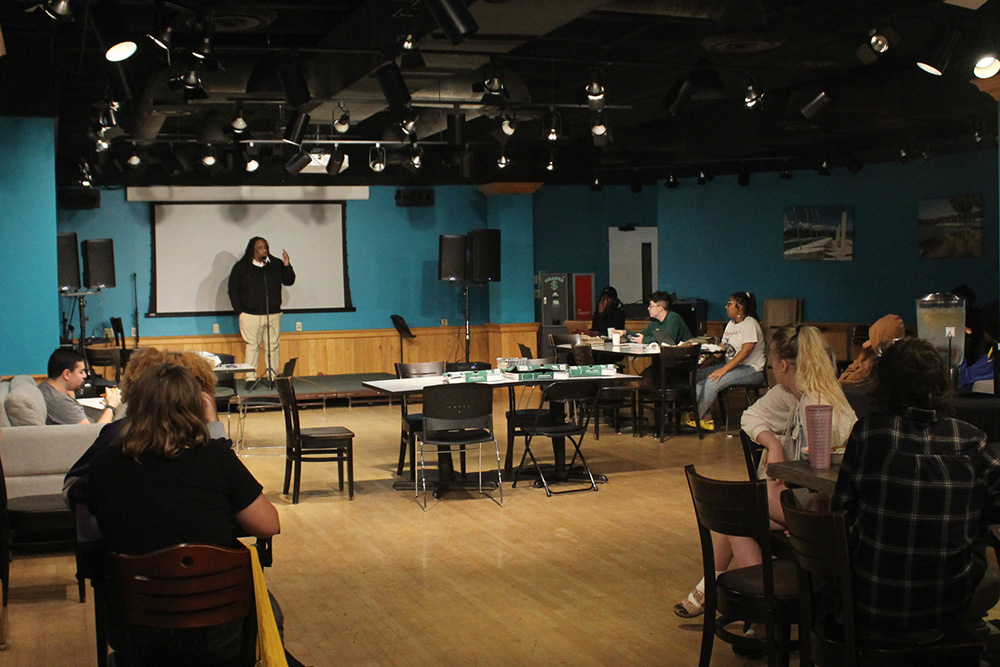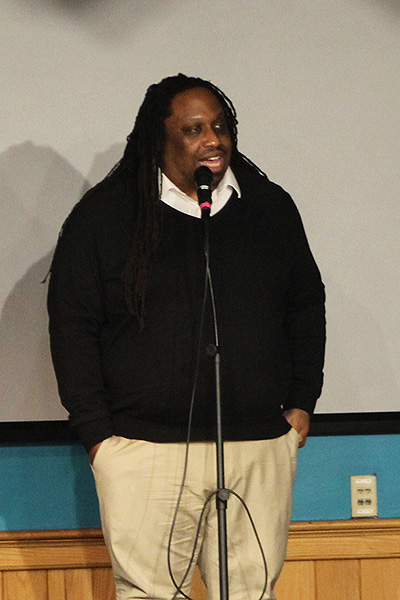
Creative professional Ed Mabrey shared his interactive and engaging poetry with students in Triton’s Pub. Photos by Justin Hollis ’24
Snaps and cheers overpowered the pop music floating from behind the service counter at the Eckerd College Triton’s Pub.
Atlas Chambers, a senior visual arts and creative writing student from Winter Garden, Florida, was the first brave poet to bear his soul for the Afro-American Society’s Black History Month Slam Poetry Night on Feb. 22.
Aja Jones—a junior animal studies and marketing student from Jacksonville, Florida, and president of the club—explained the rules at the start of the night: snaps only, no claps. After a few more student performers shared their words, including Aja’s reading of an original poem about Black History Month, she invited a special guest to the stage.
The first thing Ed Mabrey said when he took the stage was “Don’t snap for me. I want you to make your hands kiss.” Applause (hand kisses) echoed off the teal walls.
Mabrey is a creative professional based in Los Angeles. His poems break the traditional poetic form. They are interactive, performative, conversational and engaging.
Many of Mabrey’s poems included numbers to section the performance. One poem listed the top six best foods in the whole world. This one felt like a comedy skit, but the repetition of the numbers made it clear it was a piece of poetry.
“Number One: orange Tic Tacs. Not blue or green or white. Orange. Don’t trust people who eat blue or green or white Tic Tacs,” Mabrey’s deep voice boomed.
The centering poem told a story in which Mabrey asserted his purpose for coming to Eckerd College (besides the invitation).

Ed Mabrey
“I came for a very specific purpose, and that’s you. I’m here from the future, your future,” he began.
The poem went through each year of the listener’s life. It was about how you, the protagonist, went through your early life pushing people away. At 40, he said, you had miraculously fixed all the problems in the world: racism, drug culture, rape culture and all the other problems. But you were alone. And you spent each birthday drinking wine and eating ice cream and writing your suicide note.
The theme of this poem was that self-care is crucial. Mabrey was sent from the future to remind you, in the audience, of that.
Much like “you” in this piece, Mabrey had his heart broken over a decade ago. In the wake of his heartbreak, he wrote a poem.
“It was a terrible poem,” he said. But that one terrible poem catapulted him into a career of performance. Now he travels to colleges all over the country as a full-time performer. The best part of his job is connecting with students. He said it keeps him young, and he often gets to be the beginning of someone asking for help, which is the most rewarding part.
Between his skits, he improvised, calling out members of the audience and referring to them by a defining feature. “You, in the striped sweater!” or “girl sitting sideways,” or “laptop” were recurring references from the performance at the Triton’s Pub. These engagements drew students from the back of the room to the front of the stage.
Anaiya Elder, a sophomore animal studies and marine science student from Avon Park, Florida, sat in the rear of the Pub with two of her friends. Even though her back was turned to Mabrey, he called to her. Finally, she heard him and approached the stage, unsure—nervous to have so many eyes on her.
Mabrey asked for her name, class year, major and what she wants to be when she grows up. She stood a little taller with each answer to his questions.
“I love you,” he said. “I don’t like you, I don’t know you, but I love you. Go back to your seat.”
She did, and Mabrey moved into his final poem.
In this one, he introduced the Heart Exchange Love Program, also known as HELP. Each person in the audience put one hand over their heart and, on Mabrey’s cue, pressed down. Then they balled that hand into a fist, said their name into it and blew it into the room. With the other hand, they “caught” a neighbor’s heart. This was Mabrey’s way of demonstrating a connection between each person and someone else in the audience.
“Now you owe them five minutes of your life. If someone in this room mentions me to you in the next seven days, that means they’re asking you for help, and you owe them five minutes,” he said.
The audience was quiet, contemplating the meaning of these new connections.
“You don’t have the privilege of time to hate someone else,” Mabrey continued. Then he gave the audience a challenge.
“Tomorrow, [to] every single person who says, ‘Hey,’ to you, say, ‘I love you,’ back to them—and keep walking. The worst thing that happens is they look at you like you’re stupid, they go tell their friends, and then you’ve got all these people talking about love who would never otherwise talk about love.”
Mabrey left the stage to the sound of thunderous applause.
Aja first connected with Mabrey at a student activities conference she’d attended in Houston, Texas, with the Eckerd College Organization of Students in the fall. After experiencing one of his performances, she invited him for Black History Month.
The final poem was the highlight of the night for Aja because she believes the message of love has the power to stop discrimination.
“I want people to know poetry can take all different forms,” she said.
And so can love.












